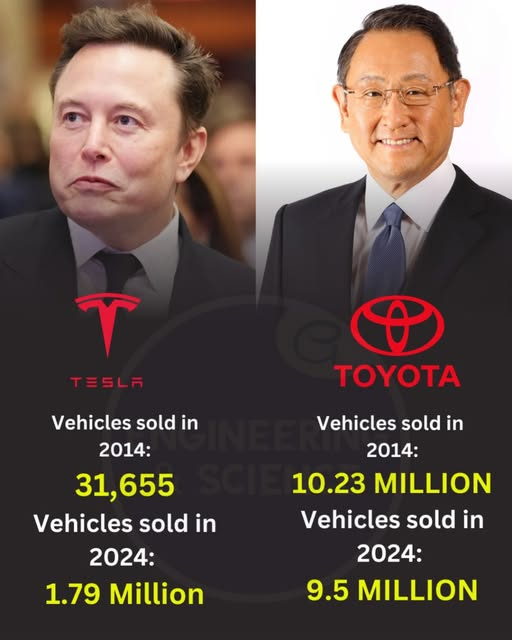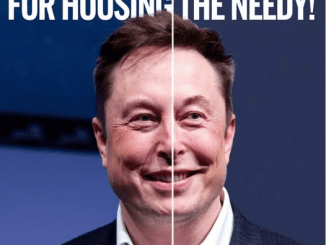
Over the past decade, the automotive industry has undergone a seismic shift, with Tesla redefining the market and Toyota maintaining its stronghold as a global powerhouse. The competition between these two industry giants highlights the evolving landscape of mobility, where electric vehicles (EVs), artificial intelligence (AI), and sustainable energy solutions are shaping the future of transportation.
Tesla’s Meteoric Rise: 5,500% Growth in a Decade
Tesla’s journey from a niche EV manufacturer to the world’s most valuable car company is nothing short of extraordinary. In 2014, the company delivered just 31,655 vehicles. Fast forward to 2024, and that number has skyrocketed to 1.79 million, marking a staggering 5,500% growth in just ten years.
The key drivers behind Tesla’s unprecedented expansion include:
🔹 AI-Powered Automation – Tesla’s factories leverage cutting-edge AI and robotics, allowing for efficient production and scalability.
🔹 Autonomous Driving Technology – Tesla’s Full Self-Driving (FSD) system continues to evolve, bringing the company closer to a future of fully autonomous vehicles.
🔹 Battery Innovations – Advances in battery efficiency and energy storage solutions have given Tesla a crucial edge in the EV race.
🔹 Global Expansion – With Gigafactories in China, Germany, and the U.S., Tesla has rapidly scaled production to meet global demand.
🔹 Sustainability Commitment – As a pioneer in renewable energy solutions, Tesla’s mission extends beyond cars, encompassing solar energy, energy storage, and AI-driven efficiency.
Tesla’s rapid growth has disrupted the traditional auto industry, forcing legacy manufacturers to accelerate their electrification efforts. However, one company has remained a formidable competitor—Toyota.
Toyota’s Enduring Legacy: A Global Powerhouse
While Tesla has surged ahead in EV innovation, Toyota remains an undisputed leader in the global auto market. The Japanese automaker sold 10.23 million vehicles in 2014 and has maintained a dominant position with 9.5 million sales in 2024.
Toyota’s sustained leadership is built on several strategic advantages:
🔹 Hybrid Dominance – Toyota revolutionized hybrid technology with the Prius, and continues to lead in fuel-efficient vehicles with its Hybrid Electric Vehicle (HEV) lineup.
🔹 Mass-Market Reliability – Known for affordability and durability, Toyota vehicles remain a top choice for consumers worldwide.
🔹 Cost-Effective Manufacturing – Toyota’s lean production system ensures high efficiency and competitive pricing.
🔹 Global Supply Chain Strength – Toyota’s vast manufacturing and distribution network allows it to weather economic shifts better than most competitors.
🔹 Balanced EV Strategy – While Tesla focuses on fully electric cars, Toyota has invested in a diverse range of hybrids, plug-in hybrids (PHEVs), hydrogen fuel cells, and EVs.
Unlike Tesla, which is betting solely on EVs and AI-driven autonomy, Toyota is taking a multi-faceted approach to the future of transportation.
The Future of the Automotive Industry: Tesla vs. Toyota
The rivalry between Tesla and Toyota represents two contrasting visions for the future of mobility:
✅ Tesla’s Vision – A fully electric, AI-integrated, self-driving future driven by software, battery advancements, and automation.
✅ Toyota’s Vision – A balanced, diversified approach that combines hybrids, EVs, hydrogen, and mass-market affordability.
As the industry accelerates toward a zero-emission future, both companies will play critical roles in shaping global transportation. Tesla is pioneering AI-powered autonomy and EV technology, while Toyota is leveraging its hybrid expertise and manufacturing efficiency to remain competitive.
The question remains: Will Tesla’s rapid expansion lead to long-term dominance, or will Toyota’s diversified strategy help it retain its global leadership? One thing is certain—the battle for automotive supremacy is far from over. 🚗⚡


